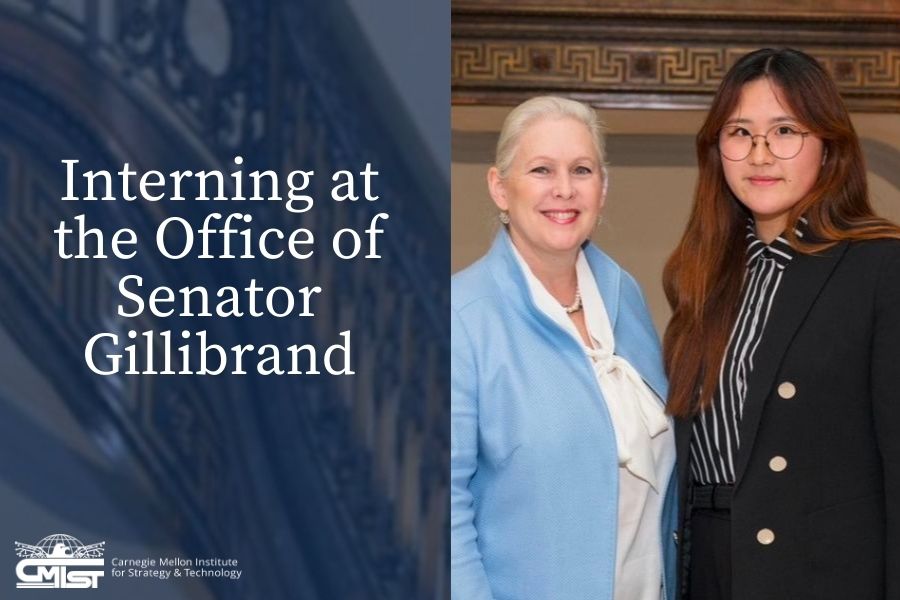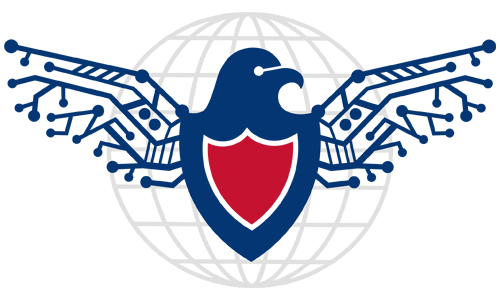
Interning at the Office of Senator Gillibrand
By Lindsay Marcellus
“A great opportunity to get the Hill experience that cannot be recreated anywhere else”
Before she began her internship in the Office of Senator Kirsten Gillibrand (D-NY) last semester, Victoria Jung was expecting the office environment to be strict and intimidating. Yet she quickly found that her supervisor and the staffers were laid back and kind, and that they created a positive atmosphere. This work environment helped her assimilate quickly and “made it less intimidating to have conversations with higher-level staffers and even take on projects from them.” It helped that she entered with strong research analysis skills, which she attributes to her experience engaging in research for credit opportunities sponsored by the Carnegie Mellon Institute for Strategy and Technology (formerly the Institute for Politics and Strategy). By the end of her internship, Jung had gained insight into how Congress works and what policy areas interest her. Furthermore, thanks to the networking she did, she was able to determine her career path.
Below is an interview with Victoria Jung, Decision Science major and fall 2022 participant in the Carnegie Mellon University Washington Semester Program. Responses have been lightly edited for length and clarity.
Why did you apply for the internship?
I have previous experience working at my local Council-member’s office, so I thought it would be insightful to see how an office works on the federal level. I also thought this would be a great opportunity to get the Hill experience that cannot be recreated anywhere else, while being able to learn a lot about how DC, Congress, and policy work.
What was your favorite part of the internship?
My favorite part of the internship would have to be all the learning I did while I was there. I came into this program not knowing much about government and policy. I wanted to use this experience as an entry-point to learning about this sector and I got that and more. Working on the Hill and specifically in this office helped me learn a lot about how Congress works and which policy areas interest me. Since I went to a wide range of briefings and hearings during the course of my internship, I was also able to learn about the different committees in the Senate and what issues each committee has to handle.
Every congressional office has their different vibes and I thought our office was going to be strict based on the onboarding emails, but once I actually got into the office and got to know my supervisor and the staffers, I was really surprised by how laid back and kind they were. It was a community that I felt comfortable in very quickly which created such a positive atmosphere for me to work in. This allowed me to assimilate better in the office and made it less intimidating to have conversations with higher-level staffers and even take on projects from them. I was also able to learn a lot from these staffers directly rather than solely speaking to my supervisor for information and projects.
What were some skills you needed to carry out your duties?
Soft skills such as effective communication, the ability to work in a team-based environment, research analysis, and being adaptable are the skills necessary to successfully carry out duties in the Senate. I have experience in a local personal office and a private political firm which allowed me to learn how to conduct administrative tasks. I was also able to develop my communication skills in this sector as I had to speak with constituents and other congressional offices in those previous internships. My experience as a research associate helped immensely with my research analysis skills. All of these experiences helped me write memos from hearings/briefings for the legislative team, answer phone calls, write constituent letters, and more.
How did you develop professionally and personally over the course of your internship?
I gained more insight as to how Congress works and was able to heavily increase my communication skills. For instance, I was able to learn how to engage in conversations even when I wasn’t too familiar with the topic at hand, which was something I didn’t have to experience in the past. I was also able to hone my writing skills as memos are meant to be concise, yet informative. Having the opportunity to work on memos of various topics ranging from the Farm Bill to oversight of the Federal Bureau of Prisons helped me become well-versed in applying these writing skills to a wide range of topics which will be helpful moving forward. Personally, I was able to grow more as a person through the various interactions I had. With all of my past internship experiences being remote, I believe having the in-person aspect is very important in personal and professional growth. I was also able to determine my career path while I was here from all the networking I did with staffers from inside and out of the office.
What advice would you share with future interns?
I would say that it’s okay if you don’t know what you want to do in the future. Having experience on the Hill is a unique experience that will only help you. It’s not as intimidating as it may sound and as long as you enter the internship with an open mind, you will almost definitely have something to gain from the experience!
Photo credit: Senator Kirsten Gillibrand (D-NY) and Victoria Jung
Note: This internship spotlight was first published on the website of the Institute for Politics and Strategy (IPS). The Institute for Politics and Strategy has now evolved into the Carnegie Mellon Institute for Strategy & Technology (CMIST).
